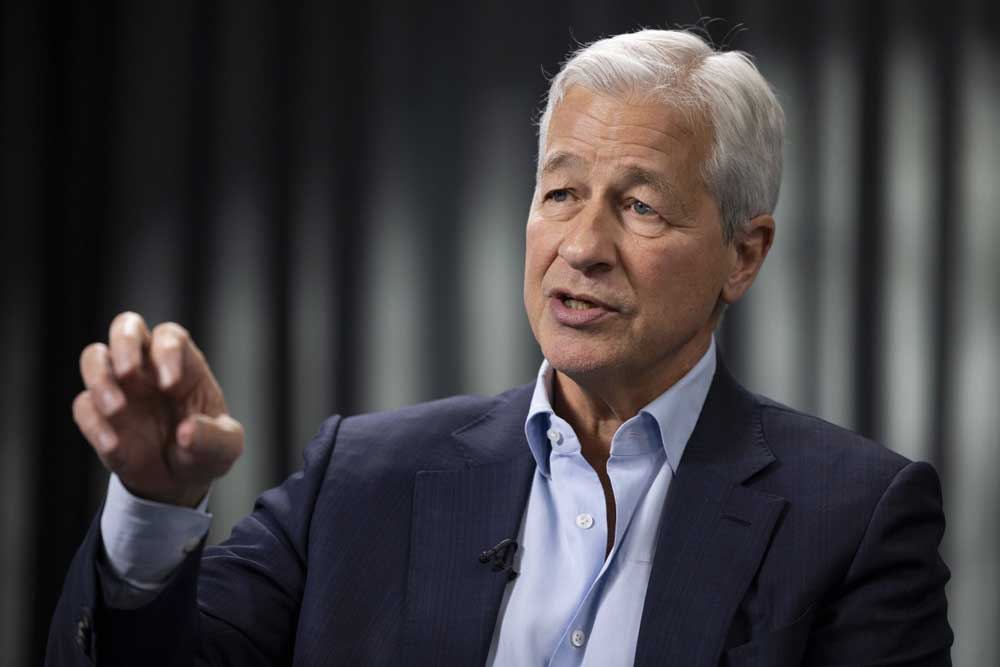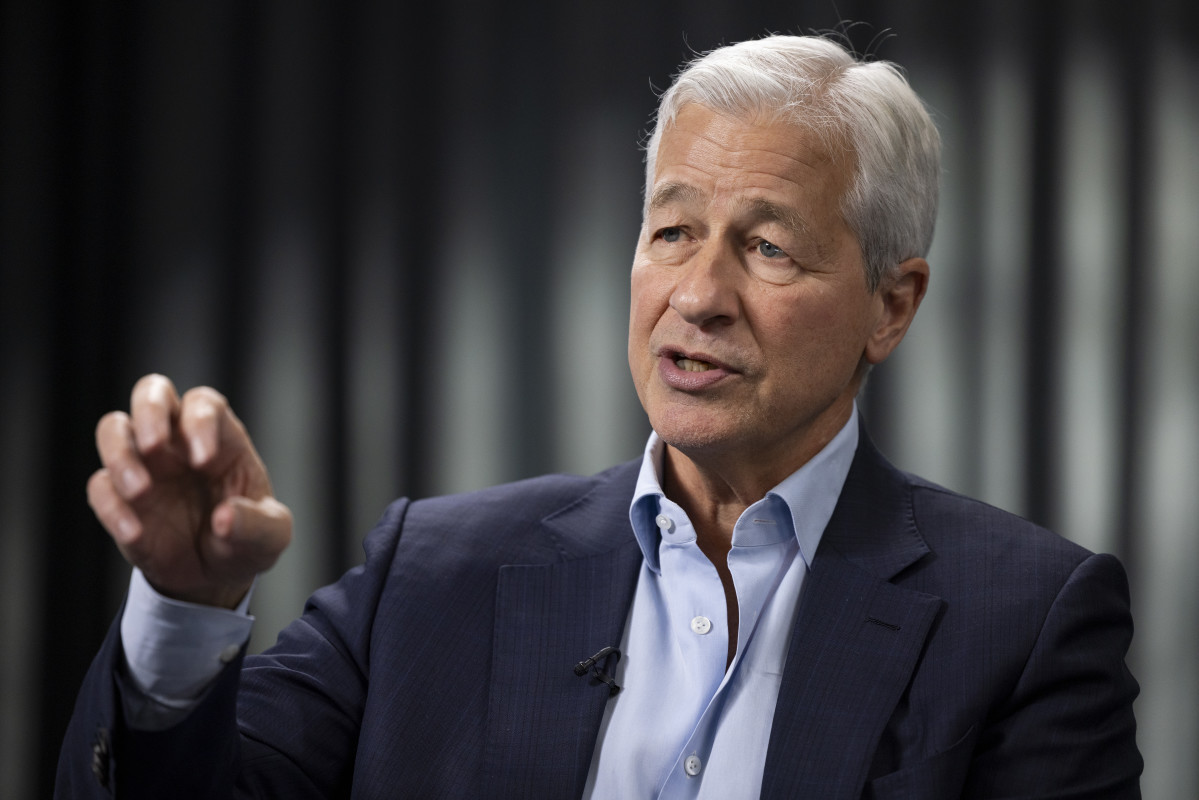JP Morgan’s stock hinges on one key metric in its earnings report
Published 7:27 am Thursday, April 11, 2024

- JPMorgan CEO Jamie Dimon told investors this week that the biggest U.S. bank was 'prepared for a very broad range of interest rates, from 2% to 8%, or even more' over the coming years.
JP Morgan (JPM) shares edged higher in Thursday trading and remain one of the market’s top-performing bank stocks this year, as investors look to the lender’s first-quarter report to help define the tenor of the broader earnings season.
The biggest U.S. banks, including JP Morgan, could see solid benefits from the market’s overhauled forecast for Federal Reserve interest-rate cuts — the federal funds rate is likely to stay elevated until at least the autumn — and from a rebound in global dealmaking.
Net interest income, a key measure of bank profitability, tends to improve in a higher rate environment as banks take in more from loans and other activities than they pay out in deposits.
JP Morgan in fact saw its 2023 net interest income rise 33% from 2022 to an overall tally of $89.3 billion as the Fed extended its rate-hiking cycle and “higher for longer” message.
The bank forecasted 2024 net interest income to be around $90 billion when it reported fourth-quarter earnings in January, a tally that will likely top expenses.

Earlier indications of at least four and as many as six Fed interest-rate cuts this year compelled JP Morgan to lower its net interest income projections for the current year. But the recent run of faster-than-expected inflation reports has markets betting on the chances of no rate cuts until early 2025.
Net interest income is key to JP Morgan report
“We expect the global U.S. banks to refine their 2024 guidance for total [net interest income] to a smaller reduction compared to NII in 2023,” CFRA analyst Kenneth Leon wrote before this week’s March inflation report.
“Most U.S. economists are currently anticipating no more than three Fed rate cuts, and if inflation remains elevated, we may not see any rate cuts in 2024.”
“Along with a healthy U.S. economy with GDP growth, this would drive potentially higher [year-over-year] gains in total NII for these banks,” he added.
Related: JP Morgan CEO Jamie Dimon delivers stark warning on inflation, economy
JPMorgan Chief Executive Jamie Dimon cautioned this week in his annual letter to shareholders that while the U.S. economy “continues to be resilient, with consumers still spending,” a good portion of the current growth rate is “fueled by large amounts of government deficit spending and past stimulus.”
He added that longer-term costs associated with the green-economy transition, supply-chain restructuring, and rising military spending “may lead to stickier inflation and higher rates than markets expect.”
JP Morgan is the fifth largest bank in the world, with a market value of around $572 billion and around $3.2 trillion in assets under its umbrella.
M&A rebound may boost noninterest revenue
Analysts see the bank posting first-quarter net interest income of $20.2 billion, a 13% slide from a year earlier, with overall revenue rising 6.25% to $41.84 billion.
When JP Morgan reports early in the morning of April 12, it’s likely to deliver earnings of $4.15 a share, a bottom line around 4% south of the year-earlier tally, analysts estimate.
The bank’s near-term financial projections, however, will be crucial for its stock performance and the broader banking sector.
That sector is expected to contribute more than a sixth — around 17.6% — of the S&P 500’s expected first-quarter profits of $494.1 billion, a level second only to the 20.2% expected from the technology sector.
“We find ourselves in an environment where stocks appear fully valued, market interest rates are climbing and the consensus expectation for Fed rate cuts is dwindling,” said John Lynch, chief investment officer for Comerica Wealth Management.
“It is therefore imperative … that corporate profits continue to expand to justify current levels of equity valuation and investor sentiment,” he added.
Related: Hot inflation report batters stocks; here’s what happens next
JP Morgan and rivals Citigroup (C) and Goldman Sachs GS are also expected to benefit from a rebound in global merger activity, as overall first-quarter deal volumes rose 30% from a year earlier to $755.1 billion.
Analyst Leon of CFRA also notes that while first-quarter equity capital markets underwriting, which includes IPOs, rose only 1% from a year earlier, it still marks the best pace of gains since 2021.
“Global U.S. banks may talk about a few ‘green shoots’ in the investment-banking pipeline,” Leon said. But he cautioned that the same big banks will likely be “more conservative on new-loan origination and credit risk.”
More Wall Street Analysts:
- Analyst unveils Nvidia stock price ‘line in the sand’
- Analyst revamps homebuilder stock price target before Fed rate call
- Analysts revamp Nvidia price targets as Blackwell tightens AI market grip
Another possible topic: Succession at JP Morgan
The bank may also discuss its newly revealed succession plans, which were included in an investor update earlier this week. Jamie Dimon, 68, is entering his 19th year at the helm of the biggest U.S. lender.
Current Chief Operating Officer Daniel Pinto, 56, was tabbed as “a key executive who is immediately ready to fulfill the responsibilities of the CEO” should the need arise. Also in the frame: The co-CEOs of JP Morgan’s commercial and investment bank, Troy Rohrbaugh and Jennifer Piepszak.
JPMorgan shares are up about 13.5% for the year as of the last check on April 11.
Related: Veteran fund manager picks favorite stocks for 2024






